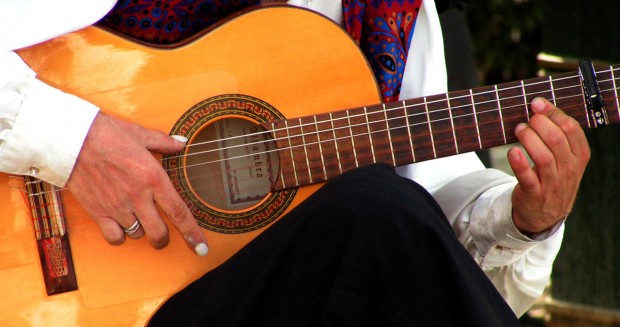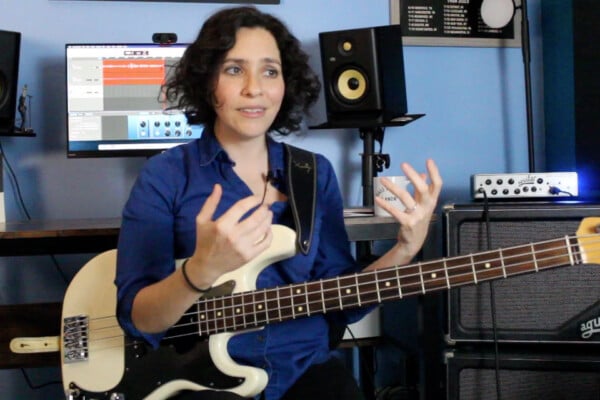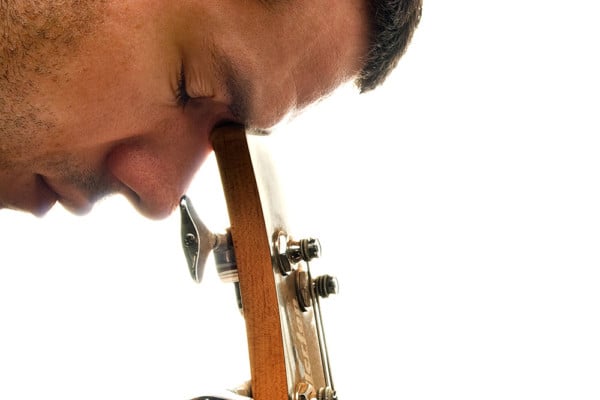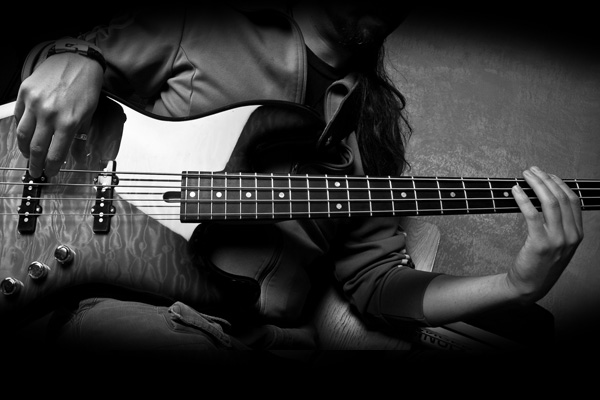Can You Learn Bass Using a Guitar?

Q: Is it possible to learn to play bass by using my six-string acoustic/electric guitar? I don’t really have the extra bread to buy a bass and amp right now, but I feel called to learn and with time, become proficient on the electric bass and maybe double bass eventually. My goal is to take a solid musical approach, learning to site read as I go, and develop a solid mastery of rhythm and fret-board.
A: I think that’s actually a pretty great idea, and I applaud your drive to learn the instrument. There will, of course, be a number of things that will be completely different once you get your hands on an actual bass.
Here are some things to be aware of:
1. Tone. Tone and range is the defining factor with regard to the role of an instrument. A baritone guitar would likely be best but, even with a baritone guitar, the tone won’t allow the instrument to function as a bass guitar without the aid of some effects. That said, you could probably get pretty darn close with a little assistance from your EQ and an octave pedal (although, for a clean bass sound, nothing beats a bass!)
2. Scale length, string spacing and string size. Simply put, guitars take far less finger strength and the strings are too close together to effectively work on your right hand fingering technique. There really isn’t much you can do about this. A classical guitar would offer a wider spacing, but it still feels nothing like a bass in the right hand. Of course, the string size is completely different. I would encourage you to work on some finger-style guitar playing in order to facilitate some good right hand finger independence (I encourage bassists to do this as well). Lastly, unless you have a very long guitar or short bass, the scale lengths are vastly different. Just know that you’ll be reaching much further out to grab that low F on a bass than you will on your guitar. Your muscle memory will be off when you make the transition.
Those are just a couple of things to be aware of, but I wouldn’t let them deter you in the least. I’ve always thought guitarists make for interesting bass players because they tend to think more melodically – generally speaking – simply because they tend to learn the actual melodies to songs while we spend years worrying only about the foundational harmony notes.
Of course, the first four strings are the same if you’re playing a 4-string bass, although 6-string basses are typically tuned differently than 6-string guitars. You’ll likely be relieved at the symmetry of the instrument. You can certainly get a large amount of work done on a guitar and make the transition down the road. You’ll have a huge leg up on the process and will just have to rework some muscle memory and possibly build up a little more finger strength.
All of those issues will be compounded if you transition to double bass, but not much more so than a bass guitar player who transitions to double bass. I am exploring the double bass myself and am running into the same issues. Longer scale length means that the notes aren’t where my fingers expect them to be. Bigger strings mean that I have to pluck way harder than my hand wants to. And of course, the lack of lines compounded with the longer scale length means that I can’t play in tune to save my life.
All that is necessary for either of us is to put in the time on the new instrument, being glad that we put in the time we did on our previous instruments, because we are that much further along.
Can you play guitar for now to try and develop skills on the bass? Absolutely. In fact, I encourage you to play the drums as well!
I know that many of our readers started on the guitar and made the transition to bass. Plenty play both. If you’re in that category, chime in and tell us how you think your skills on one inform the other.
Have a question for Damian Erskine? Send it to [email protected]. Check out Damian’s instructional books, Right Hand Drive and The Improviser’s Path.




I’ve had an interesting evolutionary transition into bass guitar myself. I concur with the idea that having a history on any other instrument is a leg up.
I started on piano as a youngster, then spent many years as a 1st violinist – something that I think relates to that melodic-guitar background. That training has made me a much better bass player in that I’m hearing many other possibilities in my head from a harmonic approach to the bass guitar. That – has served me well.
The challenge in the beginning was the finger-muscle-memory you mentioned, and the subsequent training involved in expanding my left hand to hit the frets properly. Repetition, repetition, repetition, right? ;)
(Can’t quite play the fiddle anymore – fingers are too crowded!)
Best thing to do transitioning from guitar to bass, in my mind, is to honor the role of the instrument itself -FIRST- AND RHYTHMIC CARE IS KEY- then bust out the decorations tastefully, using what you know from the melodic/harmonic sensibilities you already have.
Always keep your drummer in check on time – keeping. You’re way better at that because you have a Groove to keep ;)
Thump away.
Oh yeah….you really should buy the cheapest bass you can find just to wrap your mind around the physicality of the instrument :)
It might not be your cup of tea, but give a listen to Hound Dog Taylor; “I never had me no bass player cause I could never find one who could keep up!!!”
I actually started playing acoustic guitar before trying bass. There are similarities in right hand technique for flamenco guitar and bass. At least in expression. I’ve also tried electric guitar, but I didn’t like the sound, which to me, is more about effects you use rather than creatively expressing yourself. Some basic understanding of drum techniques is a must for a bass player.
Drummers should be a bass player’s inspiration for sure! Understanding fills and accents ~ KEY.
When I was 12 or 13 (long ago!), I played bass in a garage band using a regular electric guitar. I even removed the highest strings, thinking I could fool the schoolkid audiences we played for by using only 4 strings. It was not a very satisfying experience musically, and I lost my job to the first kid to come along who could afford a real bass. As Damian suggested, there are some things you can learn using only the top 4 strings of a 6-string guitar, but it will never be the same as playing a real bass.
Interestingly enough, I did exactly that. Wanting to play bass lines in songs more than I wanted to play guitar cords is how I figured out I needed/should make the change. And you can work on core items like scales, arpeggios, modes and right hand technique until you get the money together.
I found myself in the position at one time, my first bass gig, in fact, where I had the gig before I had the gear. Getting the gear wasn’t an issue, but there was a period of around two weeks where I was homeworking the material I would be playing on a spare six string I owned, and I was basically playing the lines on the top four strings of the guitar. Needless to say, after I acquired the bass and amp needed for the gig, there was a small physical adjustment needed, but the tone change was like stopping driving a Ford Pinto and getting into a hot-rodded pickup truck. BOOM, the low end power was a kick in the shorts!! What fun!!
My first instrument was trombone. I played around with my dad’s acoustic guitar and friends basses before getting my own from a pawn shop. Damian has it right, but I found that learning chords on acoustic guitar helped a little in my progression as a bass player. My advice is to learn chords and scales until you can afford a bass. The fretboard is the same even though string spacing is different and knowing where notes are on the fretboard is always beneficial.
There’s lots of good advice above and here in the comments, but it’s conflicting advice. The way I see it, you’ve got two choices. You can either learn the guitar and play it *as* a guitar, or you can play a guitar like you would a bass.
If you go the second route, you’re not going to have the “history on another instrument” that these guys are talking about. If you’re not strumming chords and playing leads, etc., then you’re not going to get the benefits of playing another instrument.
On the other hand, if you *do* train yourself as a proper guitar player, you’ll have some habits to unlearn when the time comes to make the switch. It won’t just be a matter of getting used to the scale and the strings. Instead, it will be resisting the urge to overplay, getting ahead of the drums, etc.
Either approach is fine, but I’d recommend picking one and sticking with it.
You can also tune a guitar in all 4ths, like Stanley Jordan… B string up to C, high E string up to F. Or tune down in the manner of most 6-string bass players, low B to high C. As far as adding additional instrument studies to the primary study of bass, it’s limited only by time and desire, and the degree you want to specialize. If the goal is to be the greatest bassist you can be, then obviously trying to learn 10 instruments doesn’t make sense. In western music the keyboard is predominant, so that might be the most useful 2nd instrument. However, it is good to keep in mind that there is a whole world of music systems and styles out there (Indian, Arabic, Western Classical, Jazz, etc) and if you want to simplify your material life, it is possible to have only one instrument and apply it to whatever music appeals.
+1 for tuning in fourths. It makes the guitar neck fully symmetrical and means you’re not wasting time learning exceptions for the G->B string transition that won’t transfer over to bass.
Seems like a lot of trouble. You can get “a bass” for less than 100 bucks. Go mow a few yards or shovel a couple driveways. Or do folks not do that anymore?
Well, if you can’t afford a bass I guess it is the best you can do but it’s not close enough and it is not the real thing. You will see for yourself when you actually get a bass which you will do eventually if you are serious about learning the instrument. In the meantime I suppose you can learn some stuff on the guitar.
Having played both mostly bass, then classical guitar, the right hand techniques are a easy change over. The classica right hand training can be an effective asset to your bass playing.
A short scale bass makes the left hand transition easier.
Learn your scales and mode theory on guitar then transpose them to the bass. Have fun with it.